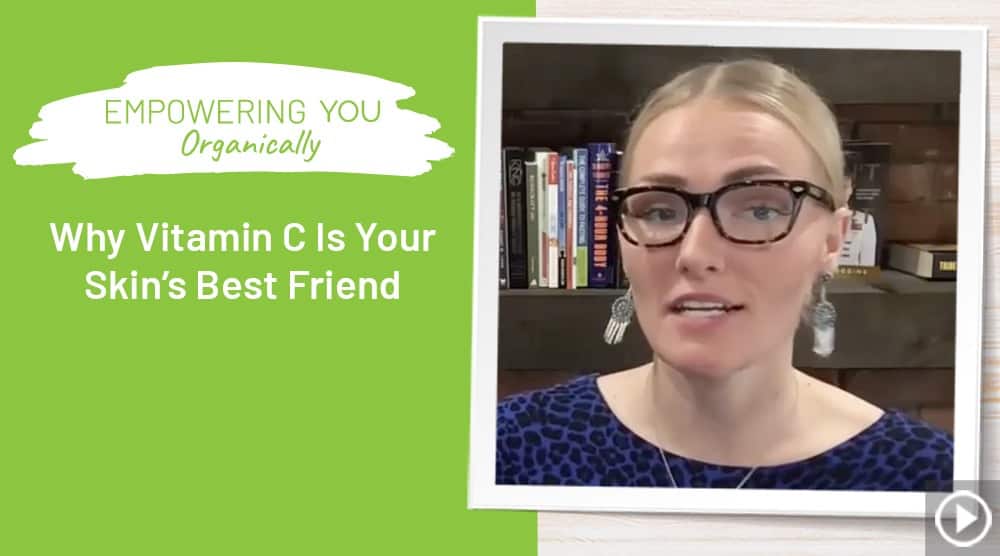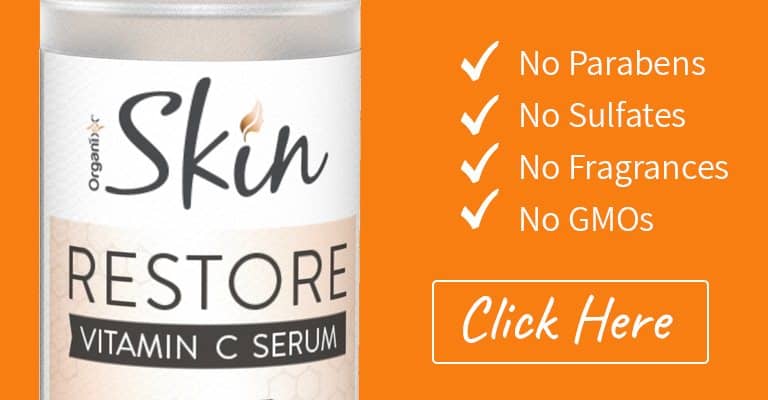Empowering you Organically – Season 9 – Episode 76
Title: Why Vitamin C Is Your Skin’s Best Friend
Hosts: Jonathan Hunsaker, TeriAnn Trevenen
Description: Fascinating topic today for you! Tune in to learn what Vitamin C does for your skin, why your body can’t make it, how it affects collagen production, the difference between dietary and topical Vitamin C, and last but not least…. the big reasons you really want to use a restorative product like a Vitamin C serum.
***
FEATURED PRODUCT
Highest concentration of Vitamin C in the industry (26%)
Patented ingredients prevent and repair deep wrinkles and tighten the skin on your face
Clean, organic ingredients that hydrate, soothe, and revive your complexion
Scientifically formulated to rebuild elasticity and promote healthy collagen production for firm, youthful skin
No preservatives or parabens
Vegan and Animal Cruelty Free
Certified Clean – Third-Party Lab Tested – Results show no GMOs, Herbicides, Pesticides, or Heavy Metals
Sometimes the simplest solutions are the best ones. This wisdom can be applied to the natural health choices we make every day too. One of nature’s simplest substances is vitamin C. What this common nutrient can do for your skin health and radiance (especially when it’s applied topically in the form of vitamin C serum) is simply amazing! Read on to discover the benefits of vitamin C for skin.
What Does Vitamin C Do for Your Skin?
Making sure you get enough vitamin C every day is essential. This is because vitamin C is the catalyst for dozens of vital cellular mechanisms in your body. This includes functions that promote healthy skin.
Besides acting as a powerful antioxidant, one of the biggest roles vitamin C plays is in the production and synthesis of collagen. Collagen is the basic building block of healthy tissue. It is formed through the binding together of key amino acids – mainly glycine, arginine, and proline. Vitamin C is vital for the creation of many types of collagen, especially Type I and III [1].
Your Body Can’t Make Vitamin C
Vitamin C is a water-soluble nutrient. This means that it dissolves in water. In addition, we have to get enough of it through external sources, since the body can’t make it. Most of the vitamin C we ingest gets used right away or is flushed out through the urine.
However, research indicates that the body can and does store some amount of vitamin C.
One of the key storage places is in the skin. The first two layers of skin – the epidermis and the dermis – both contain high amounts of vitamin C.
Vitamin C is Needed for Collagen Production
One of vitamin C’s main jobs is to add oxygen and hydrogen to the amino acids proline and lysine in order to turn them into their collagen forms (hydroxyproline and hydroxylysine, respectfully) [2].
Without a hefty amount of vitamin C in the skin, collagen production inevitably slows. This causes skin to sag and may even raise your risk of skin-related conditions and melanoma. According to a 2015 study conducted at Queen Mary University in London, having adequate amounts of certain types of collagen in the skin (namely Type VII) may even help prevent skin cancer [3].
What About Topical Vitamin C?
When it comes to topical application of vitamin C, absorbency and stability are definite challenges. For example, while scientists have found that ascorbic acid is the most effective type of vitamin C to use topically, it is often problematic since it is also very unstable.
This means that it breaks down and becomes ineffective when exposed to heat, light or air. In addition, absorption into the skin is poor when it’s mixed with a simple liquid like water.
The Solution? Vitamin C Serum
Vitamin C serum is a liquid concentration that is meant to be applied on the skin topically, especially to the face. The vitamin C is usually suspended in a neutral lipid, such as glycerin or an oil.
All high-quality vitamin C serums for the face should be able to:
- boost collagen production in skin
- add another level of protection against harmful pollutants and the sun
- help skin look and feel great without irritation [4]
4 Big Reasons Why Vitamin C Serum Is Your Skin’s Best Friend
#1 – Vitamin C Helps Keeps Skin Young
While vitamin C serum can’t get rid of every wrinkle that comes with age and too much sun exposure, it can help to reduce them – and sometimes quite significantly. Vitamin C is a powerful antioxidant that has the ability to protect sensitive skin from the aging effects of the sun. Just as important, however, is vitamin C’s role in the production of collagen.
Collagen provides structure and elasticity to skin. This means that the level of collagen in the skin directly correlates to how smooth, supple and elastic a person’s skin looks and feels. Unfortunately, studies have proven that after around age 20, collagen production decreases dramatically with each passing year [5].
Vitamin C serum can help to replenish collagen stores as we age. Using ultrasound technology, scientists at the Iuliu Haţieganu University of Medicine and Pharmacy analyzed cutaneous changes to the facial skin of women who applied a 5% vitamin C solution for a total of 60 days. The German team found that “topically applied vitamin C is highly efficient as a rejuvenation therapy, inducing significant collagen synthesis in all age groups with minimal side effects [6].”
#2 – Vitamin C Serum Protects Skin from the Sun
You may be interested to know how you can protect yourself from the sun without having to avoid it at all costs (sun exposure is how we obtain vitamin D, after all) and without having to slather your skin with toxic commercial sunscreen.
As a powerful antioxidant, vitamin C protects the skin by warding off free radical damage caused by UV radiation that can lead to DNA mutation, according to research conducted at Memorial Sloan-Kettering Cancer Center, amongst many others [7].
It’s important to still use good judgment when it comes to sun exposure and protection. That being said, upping your vitamin C levels by applying vitamin C serum to areas of your body that get the most exposure is a sound strategy.
According to the National Cancer Institute, areas that are most exposed to the sun (such as the face, neck, arms, and hands) are the most likely places where skin cancer can occur [8].
#3 – Vitamin C Serum Can Hydrate the Skin
Using a high-quality vitamin C serum can also help to keep your skin hydrated by decreasing water loss at the trans-epidermal level [9].
How? Retained water molecules are a happy byproduct of increased collagen production as well as the production of hydroxyproline through vitamin C-assisted collagen synthesis. A derivative of vitamin C, known as magnesium ascorbyl phosphate, also contributes to the hydrating effect of vitamin C [10].
#4 – Vitamin C Serum Can Help Reduce Under-Eye Bags
Vitamin C’s ability to hydrate the skin, as well as its antioxidant capabilities, helps to lower inflammation. This can assist in getting rid of “puffy eyes” or those under-eye circles that can creep up because of lack of sleep, poor dietary choices, or other stressors.
A 2018 meta-analysis of over 300 other sources determined that vitamin C can help reduce C-Reactive Protein (CRP) levels [11]. High CRP corresponds to high inflammation levels in the body.
The anti-inflammatory mechanisms in vitamin C may also help to even out age spots and pigmentation blemishes as well as balance skin tone. Research conducted at Tulane University in New Orleans suggests that topical vitamin C may be helpful in combatting other, more serious dermatological conditions as well [12].
I Already Take Vitamin C Supplements. Why Do I Need Vitamin C Serum?
This argument makes practical sense. Unfortunately, according to the research, it’s not necessarily true. A 2017 analysis at the University of Otago in New Zealand took a look at the benefits of both dietary and topical vitamin C on skin health [13].
According to the study report published in the journal Nutrients, vitamin C consumed internally can only help skin in a person who is deficient to begin with. On the other hand, the multitude of studies conducted on vitamin C serum have proven that topical vitamin C application appears to have beneficial effects no matter what a person’s status [14].
Should You Try Vitamin C Serum?
Now that you’re aware of the benefits of vitamin C for skin, you may be contemplating a vitamin C serum to boost your own skin health. However, choosing a high-quality vitamin C serum can be confusing.
The type of vitamin C used and the concentration of vitamin C overall are factors that can change with each brand. In addition, you’ll want to look for a quality serum that contains additional natural antioxidants that help to enhance stability and ensure the highest amount of absorbency.
The decision to add any product or protocol to your toolbox for vibrant living is a personal one, and one you should consult with your health professional about if you are unsure. That being said, the research seems to prove without a doubt that vitamin C serum can have great benefits for skin health, with minimal if any negative effects.
If you’re someone who wants softer, smoother, more vibrant-looking skin, then a high-quality, all-natural vitamin C serum such as Organixx Skin: Restore Vitamin C Serum may be a health and beauty tool you don’t want to be without!
***
Subscribe to Empowering You Organically
Never miss an episode!
APPLE PODCASTS SPOTIFY GOOGLE PODCASTS






